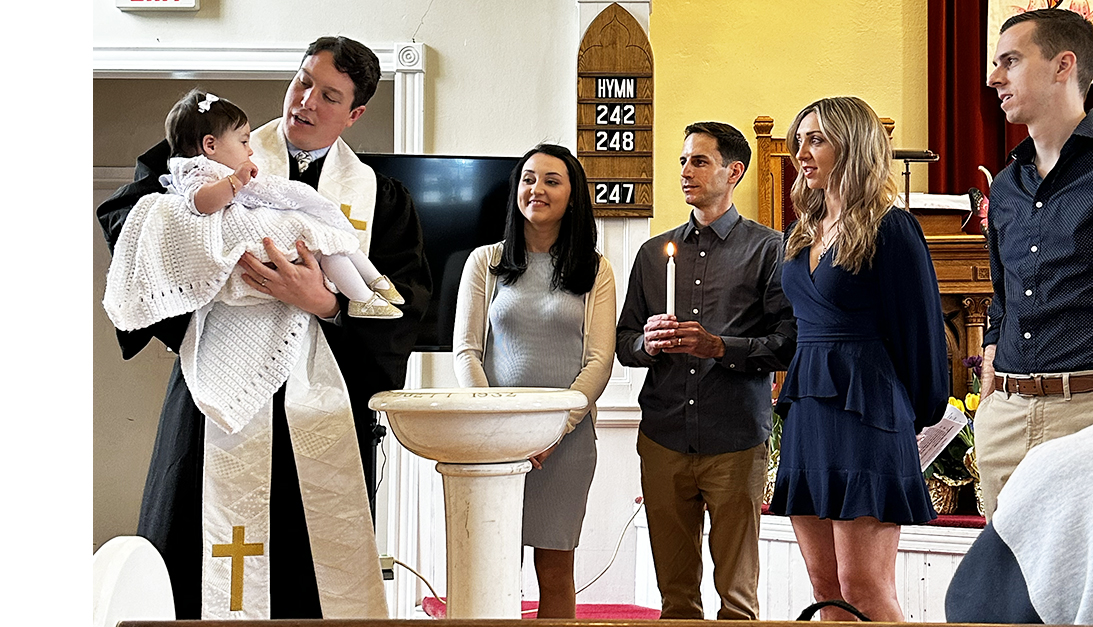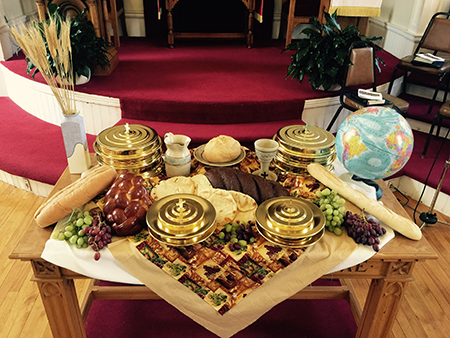Baptism and Communion
Baptism

We believe that the sacrament of Baptism is an outward sign of inward grace. Baptism places each of us into the body of Christ, the church, which is the universal church of believers in Christ, and that sacrament is big enough, strong enough, and cleansing enough to last forever. Because of this, we believe that people are only Baptized once in their lives, regardless of the tradition into which they were baptized. We believe that anyone can be baptized at any age. God’s love for us has no beginning and no ending, and Baptism is our recognition of that unconditional gift. Baptism is not only a recognition of God’s unconditional love for us, but it’s a recognition of the mutual commitment between the person being Baptized (or their family) and the congregation. We acknowledge that to raise children in faith, or to live a life of faith, takes a whole community. People in the wider church are teachers, mentors, friends, surrogate parents, grandparents, and role models in a person’s faith journey. It is also a commitment on behalf of the person themselves, or the parents of the child, to be active participants in the life of the church, for it is through being in ministry together that we are the Body of Christ.If you are interested in being baptized or in having your child baptized, we invite you to join us in Sunday worship to discern whether you want to partner with our congregation in your journey of faith. If you are part of our church community and you are interested in Baptism for yourself or your child, please contact the office.
Communion
 We participate in the Sacrament of Communion on the first Sunday of every month, in addition to worship on Ash Wednesday (the start of Lent), worship on Maundy Thursday (the Thursday before Easter) our two worship services on Easter Sunday, and worship at our 11:00pm service on Christmas Eve. Everyone, everyone, everyone is invited to participate in Communion. We believe that Christ is the host of the table and there is room for all of us: believer, doubter, questioner, seeker, faithful, sinful, wherever you land on the spectrum, you are welcome. You can be older or younger, Baptized or not, church member or not, Christian or not. All are welcome. Many of us carry different understandings of Communion with us, so we each interpret the sacrament in a way that is personally meaningful. We use grape juice and we offer gluten free wafers in our Communion services, so that all may participate. We usually take Communion through passing trays of bread and juice through the pews, and then eating and drinking after all have been served. Occasionally, we will take Communion through Intinction, in which people process forward to receive the bread and juice individually from the servers. Either way, all are welcome to participate, and of course, anyone is welcome to respectfully decline as well.
We participate in the Sacrament of Communion on the first Sunday of every month, in addition to worship on Ash Wednesday (the start of Lent), worship on Maundy Thursday (the Thursday before Easter) our two worship services on Easter Sunday, and worship at our 11:00pm service on Christmas Eve. Everyone, everyone, everyone is invited to participate in Communion. We believe that Christ is the host of the table and there is room for all of us: believer, doubter, questioner, seeker, faithful, sinful, wherever you land on the spectrum, you are welcome. You can be older or younger, Baptized or not, church member or not, Christian or not. All are welcome. Many of us carry different understandings of Communion with us, so we each interpret the sacrament in a way that is personally meaningful. We use grape juice and we offer gluten free wafers in our Communion services, so that all may participate. We usually take Communion through passing trays of bread and juice through the pews, and then eating and drinking after all have been served. Occasionally, we will take Communion through Intinction, in which people process forward to receive the bread and juice individually from the servers. Either way, all are welcome to participate, and of course, anyone is welcome to respectfully decline as well.
Here is a little bit about our theological understanding of Communion:
In the sacrament of Holy Communion, also called the Lord’s Supper or Eucharist, meaning “thanksgiving,” Christians hear, taste, touch and receive the grace of God revealed through Jesus Christ in a unique way.
Communion is:
- a joyous act of thanksgiving for all God has done, is doing, and will do for the redeeming of creation;
- a sacred memorial of the crucified and risen Christ, a living and effective sign of Christ’s sacrifice in which Christ is truly and rightly present to those who eat and drink;
- an earnest prayer for the presence of the Holy Spirit to unite those who partake with the Risen Christ and with each other, and to restore creation, making all things new;
- an intimate experience of fellowship in which the whole church in every time and place is present and divisions are overcome;
- a hopeful sign of the promised Realm of God marked by justice, love and peace.

 Open & Affirming
Open & Affirming